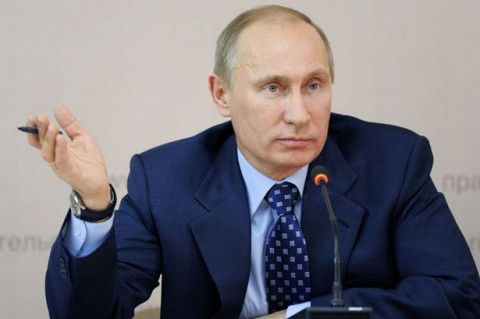
Russia may be the target of US sanctions if Moscow grants asylum status to Edward Snowden, the former spy agency contractor wanted by the United States for leaking secrets about U.S. surveillance programs involving phone and Internet data. Snowden appears, currently, to be in limbo, but will Russia bend to the threat of US sanctions?
Sen. Lindsey Graham, a Republican from South Carolina, initiated a measure making any country that will offer asylum status to Snowden subject to US sanctions. The Senate Appropriations Committee unanimously approved the measure on Thursday. Moscow has not immediately reacted to the Senate measure. Russia’s stance, however, could be predicted by previous comments by Russian President Vladimir Putin, who criticized the USA as being hypocritical. While an official reaction is still expected from Moscow, the question arises: Will Russia bend to the US threat?
Quoted by the Associated Press, Graham said “the right thing to do is to send him (Snowden) back home so he can face charges for the crimes he’s allegedly committed. Graham explained that the measure he initiated requires to the State Department to coordinate with lawmakers on setting penalties against nations that seek to help Snowden avoid extradition to the United States. US authorities want him prosecuted for revealing details of the government’s massive surveillance system. The proposal was unanimously approved by voice vote. It constitutes an amendment to next year’s $50.6 billion diplomacy and international aid bill.
Even though Snowden has been inside the Moscow airport transit zone – where he officially requested temporary asylum status – for over a month, Russia is not the only country targeted by Graham’s bill. Snowden arrived at Moscow’s Sheremetyevo airport on June 23, on a flight from Hong Kong. Other countries, such as Venezuela, Bolivia and Nicaragua are on the list as they have openly offered to grant asylum to the US leaker, after he divulged secret information. Cuba is another possible country where Snowden could seek asylum.
According to his Russian lawyer, Anatoly Kucherena, Snowden is still inside the transit zone, facing Russian bureaucracy, despite the fact that his request for asylum was officially received. He has not yet expressed any intent to move to another country. “Snowden looks well. I can’t say he is happy or sad. He is in a situation when he is waiting for Russia’s decision. He asked what to do next if he is refused asylum in Russia. He’s trying to be brave,” said Anatoly Kucherena Wednesday after he retracted to his earlier announcement that Snowden was given documents allowing to enter Russia. “Unfortunately, the situation that has come about is not standard for Russia, (we are) facing some bureaucracy: the documents are still being considered. … We will wait and hope that the issue will be resolved in next several days,” he added. Even though it is still difficult to guess what the Russian authorities’ reaction will be, their previous stance stands. Talking to students, Putin said last week that Snowden “is being pursued by the US government and fears for his life, and safety; that he will be tortured or receive the death penalty if he returns to the United States.”
More recently, Putin implied hypocrisy on the part of the US; comparing this situation to that of Snowden. He told reporters that the Washington has been hypocritical in complaining about Russian actions while seeking to prosecute a leaker who exposed American surveillance programs. His reaction came out after US criticism over the conviction of prominent Russian opposition leader, Aleksei A. Navalny. The US administration cited a trend of “suppressing dissent and civil society in Russia”. Navalny was convicted on embezzlement charges and sentenced to five years of imprisonment just one week after the posthumous conviction of another of Putin’s opponents, Sergei L. Magnitsky, a lawyer investigating official corruption. Magnitsky was arrested and died in custody.
The USA is still pushing to obtain Snowden’s extradition. On Wednesday, Secretary of State John Kerry discussed the matter with Russian Foreign Minister Sergei Lavrov. The Russian news agency Itar-Tass reported that U.S. Attorney General Eric Holder sent a letter to the Russian Justice Ministry about Snowden. The Russian Justice Ministry told the media that, according to letter, “all extradition issues were in the competence of the Russian Prosecutor General’s Office.”
Another indication is certainly Putin’s comment about the state of the relationship between USA and Russia. “Bilateral relations, in my opinion, are far more important than squabbles about the activities of the secret services,” Putin said a week ago, referring to his scheduled Moscow meeting with Obama.
Relations may depend on the next Obama-Putin face-to-face talks, ahead of the St. Petersburg G20 summit, scheduled for September. White House spokesman Jay Carney showed uncertainty when talking about President Obama face-to-face talks with his Russia counterpart. When responding to a question from a reporter, Carney refused to make any further announcements regarding Obama’s visit. An administration official said the White House’s lack of information about the Obama Moscow visit is confirmation that the President is very upset about the issue.
But the final question will be: will Russia bend to the US threat? We shall wait and see.
Eddy Isango
Sources; the Associated Press, RIAOVOSTI, the Moscow Times and Russia and India Report



One thought on “Edward Snowden in Limbo: Will Russia Bend to the Threat of US Sanctions?”
If the Aliens don’t get him the MEN IN BLACK will !!
Comments are closed.